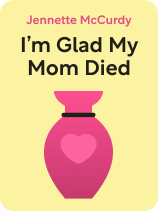

This article is an excerpt from the Shortform book guide to "I'm Glad My Mom Died" by Jennette McCurdy. Shortform has the world's best summaries and analyses of books you should be reading.
Like this article? Sign up for a free trial here.
How do children deal with the death of an abusive parent? What can you learn from Jennette McCurdy’s own experience with her abusive mother, Debra?
In her memoir I’m Glad My Mom Died, Jennette McCurdy describes how she coped with her mother’s death when she was younger. Despite her mother being emotionally and physically abusive toward her, McCurdy found it difficult to accept that Debra ever harmed her.
Let’s look at how McCurdy dealt with such a big loss, and how you can learn from her experience.
Coming to Terms With Debra’s Abuse
McCurdy visits Debra’s grave regularly after she dies, but as the years pass, she visits less and less frequently. On one of her visits, McCurdy notes all of the superlative adjectives the family had placed on her gravestone and reflects on how she always believed her mom was all of these and more—a kind of goddess who could do no wrong. But years after the death of an abusive parent, she recognizes the truth: Her mom was a narcissist who emotionally, mentally, and physically abused her.
McCurdy catalogs some of the ways that Debra hurt her:
- Debra gave McCurdy breast and vaginal exams until McCurdy was 17. McCurdy felt violated, but her mom had taught her that she didn’t have the option of saying “no” to anything her mom thought was best.
- When McCurdy was only 6, Debra forced her into a career that McCurdy didn’t want. She never had a chance to be a child.
- When McCurdy was 11, Debra taught her an eating disorder.
- Debra lied to her about who her father was, and never told her about her biological father.
Despite the abuse, McCurdy still misses her mom and reflects fondly on some aspects of her personality. Sometimes she imagines that if her mom were still alive, she would have apologized for her actions, and the two could have a healthy relationship.
But then McCurdy realizes that this is just a fantasy. She knows that her mom never acknowledged her issues or made any effort to change during her lifetime, even though her behavior was harming her family. McCurdy knows that if Debra were still alive, she’d still be trying to manipulate McCurdy into doing and being exactly what Debra wanted, she’d still be encouraging McCurdy’s eating disorder, and she’d still be pushing McCurdy to continue in an acting career that makes McCurdy miserable. McCurdy gets up from Debra’s grave and walks away, knowing that she’ll never come back.
Healing From an Abusive Parent
Although “I’m Glad My Mom Died” is a provocative title, McCurdy has said in interviews that she didn’t mean it flippantly. She’s said that she believes people who’ve experienced parental abuse will understand the title, and she hopes that the title will make more sense to readers once they’ve heard her life story.
Psychological research supports McCurdy’s belief that if Debra were still alive, she’d still be controlling and abusing her daughter. Narcissistic and abusive parents tend to get worse, rather than better, with age, as the normal problems of aging (their own and their children’s) compound some of their abusive behaviors. In addition, people with narcissistic personality disorder are frequently resistant to changing their behavior. To address their narcissism, they have to want to change as well as be willing to do the work in therapy to make changes.
In fact, many therapists point out that because it can be very difficult to have a healthy relationship with an abusive parent, often the best option for adult children of toxic parents is to limit contact (by seeing less of a parent or by setting clear boundaries about what is and isn’t acceptable behavior) or to cut off contact completely. Psychological or physical distance from the abusive parent can be necessary to allow the child the space to heal and focus on their own needs, rather than focusing exclusively on the parent’s needs. As a result, some children of toxic parents don’t have any relationship with their parent, even if the parent is still alive.

———End of Preview———
Like what you just read? Read the rest of the world's best book summary and analysis of Jennette McCurdy's "I'm Glad My Mom Died" at Shortform.
Here's what you'll find in our full I'm Glad My Mom Died summary:
- Former child star Jennette McCurdy's autobiography
- McCurdy's difficult, often traumatic, relationship with her controlling mother
- What it's like to grow up as a child in the spotlight






